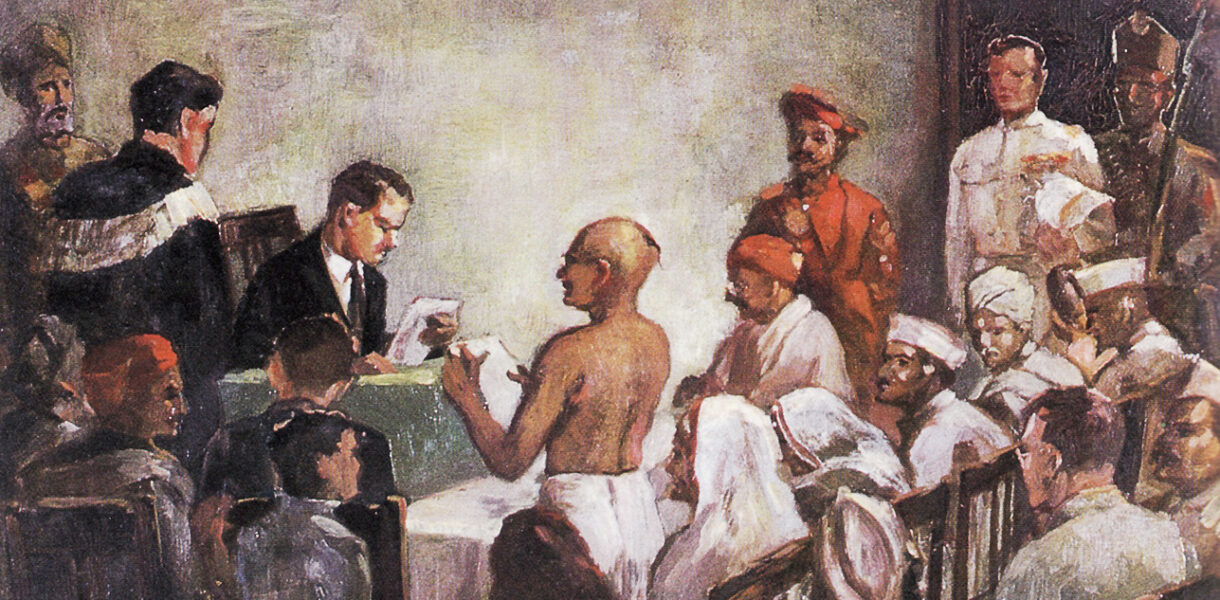
Introduction
India is the largest democratic country in the world with free speech as its precious gift. Freedom of speech and expression is crucial for any democratic country. Though it is not an absolute right, however, if a person is being stopped from using or raising its voice against the working of the Government, its policies, or against anything which is not causing any incitement of violence against the Government or creating any public disorder then this clearly exhibits that the status of democracy and the right to freedom of speech and expression is in grave danger.
Laws are made to protect the people. They must be framed and implemented in such a way that morality, peace, and public order are maintained. Sometimes laws are misused as well. One such law is the law of sedition covered under Section 124A of the Indian Penal Code (IPC) which is wrongly used as a tool to curb free speech. Recently, the Government has been abusing this law against criticism or dissent against them[1]. They are wrongfully interpreting the law in their own favour. According to the National Crime Records Bureau (NCRB), cases filed under Section 124A has increased by 160 % between 2016 to 2019, while the conviction rate dropped from 33.3% to 3.3 % for the same period[2]. This clearly shows that the State has been misusing this provision to file frivolous and baseless cases. Both State and Central Government is playing this card to eliminate voices of dissent or criticism against them.
Nowadays, the internet and social media have become the platform for the expression of views. Opinions and ideas are being exchanged between people over such mediums and there is nothing wrong with it. Citizens of India have the right to freedom of speech and expression as provided under Article 19(1)(a) of the Constitution of India which is subjected to certain restrictions[3]. The right to freedom of speech and expression is the first and foremost fundamental right as provided under Article 19 of the Universal Declaration of Human Rights (UDHR), 1948[4]. Article 19 of International Covenant on Civil and Political Rights (ICCPR) also provides that Everyone shall have the right to hold opinions without interference[5]. Now to what extent State can regulate individual conduct, often leads to a difficult question. However reasonable restrictions can always be exercised by the State.
If citizens can elect the Government by casting their votes, they can also criticise the Government. Such criticism or dissent does not form the ground for sedition if it is not inciting any violence or disturbance of public order and peace. While it is essential to protect the integrity of the country, but the sedition law must not be misused to suppress free speech. Government must understand that criticism and dissent are integral for a vibrant democracy. Therefore, this law must be carefully used after proper scrutinization.
What is Sedition?
Sedition is defined under section 124A of IPC which states that “Whoever, by words, either spoken or written, or by signs, or by visible representation, or otherwise, brings or attempts to bring into hatred or contempt, or excites or attempts to excite disaffection towards, the Government established by law in India, shall be punished with imprisonment for life, to which fine may be added, or with imprisonment which may extend to three years, to which fine may be added, or with fine.”[6] In simple words, the interpretation given by the court for section 124A is that it is an act of a person intending to cause violence or hatred against the Government. It is a non-bailable offence and the person charged hereunder are barred from government jobs, they have to live without a passport and have to produce themselves in the Court whenever required[7].
In the landmark Kedar Nath Judgement[8], it was made clear that Section 124A is not for oppressing free speech and it can be invoked if it could be proven that the speech in question led to violence against the Government which resulted in public disorder. In this case, it was held that, Kedar Nath criticised the Congress Party and not the Indian State and the speech in question did not lead to any violence or public disorder. Therefore, it does not amount to sedition.
However, even after the clear interpretation of the court still, the law is misused and abused by the legislature thereby ignoring the interpretation given by the court in the aforesaid judgment.
Interpretation of Section 124A
The sedition law is a by-product of British Colonial Rule. It was introduced to suppress the voices of Indians during the freedom movement. Section 124A as we have today was initially absent from the original IPC draft presented by Lord Macaulay in 1860. It was in 1870 that it was introduced by James Stephen[9]. Since then, it has gone through various modifications.
If we think about this law, then we can say that Britishers introduced this law in IPC because their sole aim was to deprive Indians of their rights including their right to freedom of speech and expression and suppress them during their freedom struggles. Thus, the intention behind the introduction of this law was bad where the law was enacted to ultimately suppress freedom of speech and expression. Just like mens rea i.e., intention matters for the commitment of crime as provided in IPC, in a similar manner sometimes the intention behind the creation of law also matters. The intention behind the creation of the sedition law was to suppress Indians during the freedom struggles. Currently, the Indian Government is also doing the same. Section 124A was misused then and it is being misused now.
In 1922 Mahatma Gandhi, during his trial, has already said that sedition law under section 124A is the prince among the political sections of IPC which is design to suppress the liberty of the citizens[10]. With the increasing sedition cases in India and the misuse of section 124A, it will not be wrong to say that Gandhi’s words still stand true.
Even though in the Kedar Nath Judgment V. State of Bihar[11] limited the application of Section 124A to acts involving intention or tendency to create public disorder or disturbance of law and order or incitement to violence[12]. The court further held that citizens have the right to say or write anything against the Government by way of criticism so long as it does not lead to incitement of violence against the Government, but still the law has been misused by the legislation in their own favour. A balance must be maintained between free speech and national security[13].
It must be highlighted that the Government within the ambit of this section does not include an individual person. Sedition can arise only against the Government established by law[14]. Government is basically a body or an institution and does not include an individual person. So, it must be noted that there is a difference between criticising the person holding a government position and criticising the government. If the distinction is made on this ground, then further misuse of law can be avoided.
Section 124A is vague and ambiguous. In its literal reading, it is difficult to interpret terms like hatred or disaffection towards the government[15]. In the case of Debi Soren V. The State[16], the Patna High Court made a clear distinction between the terms disapprobation and disaffection and held that only disaffection leads to public disorder[17]. After that, the landmark judgement of Kedar Nath Singh has also limited the application of section 124A and interpreted the section in the light of intention and tendency to create public disorder or cause disturbance of public peace[18]. In current times to avoid the gross misuse of the section, it stills requires a clear interpretation from the judiciary.
In the landmark judgement of Shreya Singhal vs. Union of India[19], “the word “speech” was interpreted in this case by the Supreme Court. Supreme Court stated that through you spoken or written words can advocate and propagate whatever they want to but does not incite people to violence. If because of such speeches, there is a breakdown of public order and violation of peace and tranquillity in the state then only that person can be booked under sedition.”[20]
Abuse of Section 124A
Over legislation is not necessarily a virtue. It often leads to misuse of law.
-Arun Jaitley
As quoted by the Hon’ble Delhi High Court, “Sedition law can’t be invoked to quite the disquiet”[21]. Recently the sedition cases have surged in India. Instead of section 124A being used in good faith for the welfare of the public, it is misinterpreted and used as an instrument to eliminate any criticism and dissent against the Government. It is always asserted by the Courts that balancing national security is one of the key ingredients of this law. Though, it is argued that it is just the vestige of the colonial era. Disha Ravi, Vinod Dua and Telegu Channel Case are a few of the sedition cases where the law has been highly misused by the State. Fortunately, the Indian Judiciary came to the rescue to avoid further atrocities of the State.
Disha Ravi, a climate activist was arrested in February 2021 for sharing an online document which according to Delhi Police led to violence at the Red Fort during a farmer’s protest. She was arrested without establishing that her actions led to the violence. FIR was registered against her under section 124A (sedition), 153A (promoting hatred amongst various communities on social/cultural/religious grounds) and 120B (criminal conspiracy) of the Indian Penal Code[22]. The bail was granted to the activist after 10 days of her arrest. It was held that there is no evidence to prove that her actions for either writing or sharing the ‘toolkit’ amounts to sedition[23]. This is a classic case of abuse of section 124A, where the police arrested the person on the grounds of sedition without really establishing whether the action is causing violence or incitement of violence against the State. In Disha Ravi’s Case or the Greta Thunberg toolkit case, it can be clearly visible that the law of sedition has been wrongly interpreted and implemented by the Delhi Police.
Padma Shri recipient Vinod Dua has also been falsely charged with sedition this year along with other sections of IPC including section 268 (Public Nuisance), section 501 (Printing defamatory Matter) and section 505 (intent to cause public mischief) for his comments alleging that the Government of India was not prepared regarding COVID-19 and made personal comments against the Hon’ble Prime Minister of India, Narendra Modi[24]. However, the Apex Court stayed the FIR against him and held that “Every journalist will be entitled to protection in terms of Kedar Nath Singh, as every prosecution under Sections 124A and Section 505 of the IPC must be in strict conformity with the scope and ambit of said Sections as explained in, and completely in tune with the law laid down in Kedar Nath Singh[25].” It was further held that criticism of Government does not amount to sedition.
Sedition charges were also brought up against two Telugu News Channels by the Andhra Police. The court held that Section 124A requires detailed interpretation with respect to its application to media and freedom of the press. Both these judgements are crucial for preventing harassment by the State Authority and for ensuring freedom of the press. Now, every Journalist will be entitled to protection in terms of the Kedar Nath Singh verdict.
In the Hubli Sedition Case, the Kashmiri Students were granted bail after 100 days of police custody thereby highlighting the concerning aspect of sedition law that if a person is once arrested then it becomes extremely difficult to get bail as the trial process can be stretched for long[26]. This not only leads to harassment of innocent people but also induces fear in others to speak against the Government.
These cases as mentioned above highlights the grave misuse of Section 124A. As quoted by Siddharth Narrain, “The chilling effect of these laws threatens to undermine, and gradually destroy, the legitimate and constitutionally protected right to protest, dissent or criticise the government.” Siddharth Narrain has aptly summarised the repercussions of such laws and the violation of Article 19(1)(a) of Constitution of India. If citizens are deprived of there rights by inducing fear, then it is a great disappointment for a country which call itself democratic. Right to Freedom of Speech and Expression is considered as a human right and it is a right which fight for other basic rights. One cannot raise voice against violence without the utilisation of its right of free speech.
Conclusion
When the law has the tendency to be misused or abused then the same must either be amended or repealed. Same goes for Section 124A of Indian Penal Code i.e., Sedition law. The colonial-era law has also been misused to silence Mahatma Gandhi to suppress the freedom movement. The poorly drafted Section and the ambiguous term within its definition leaves more space for the section to be misused. The loopholes and the lack of awareness with respect to Kedar Nath Judgement, the police and Government further abuse the sedition law to its very core as it was seen during Citizenship Amendment Act (CAA) and Farmers Protest. The ambiguity of this section was also highlighted by Justice D.Y. Chandrachud while deciding on the sedition charges which were brought up against two Telugu News Channels by the Andhra Police. Over the years Section 124A has been exploited by the Government to suppress the voice of the citizens thereby violating their right to free speech and expression, then why is it not being scraped off? The state cannot use this law to satisfy their wounded vanity. We are the world’s largest democracy. However, we will not be able to call ourselves a democratic country if such laws are used as weapons to suppress free speech. This power conferred within the ambit of Section 124A does not require to be limited but it should be completely repealed because in modern democracy the law of sedition has no room and the sooner, we get rid of it the better.
Photo Source: Telegraph
About The Author
Anjali Gupta is a law student currently pursuing LL.B from Amity Law School, Noida
References
-
Samanwaya Rautray, Misuse of sedition laws breaches functioning of institutions, says Chief Justice, The Economic Times, (Oct. 4, 2021, 9:29 PM), https://economictimes.indiatimes.com/news/india/misuse-of-sedition-laws-breaches-functioning-of-institutions-says-chief-justice/articleshow/84453904.cms?from=mdr . ↑
-
Rahul Tripathi, Arrests under sedition charges rise but conviction falls to 3%, The Economic Times, (Oct. 4, 2021, 9:32 PM), https://economictimes.indiatimes.com/news/politics-and-nation/arrests-under-sedition-charges-rise-but-conviction-falls-to-3/articleshow/81028501.cms?from=mdr). ↑
-
INDIA CONST. art. 19, cl.1. ↑
-
Universal Declaration of Human Rights (UDHR), 1948, art. 19. ↑
-
International Covenant on Civil and Political Rights (ICCPR), art. 19. ↑
-
The Indian Penal Code, 1860 (Act no. 45 of Year 1860), s. 124A. ↑
-
Edex Live, What the FAQ: What is India’s sedition law about and will the SC ever strike it down?, The Indian Express, (Oct. 7, 2021, 9:36 PM),
https://www.edexlive.com/faq/2021/jul/16/what-the-faq-what-is-indias-sedition-law-about-and-will-the-sc-ever-strike-it-down-22558.html. ↑
-
Kedar Nath Judgment V. State of Bihar, MANU/SC/0074/1962. ↑
-
Avinash Kumar Yadav and Amartya Vikram Singh, Decoding the history of Sedition law in India, The Leaflet, (Oct. 8, 2021, 7:48 PM), https://www.theleaflet.in/decoding-the-history-of-sedition-law-in-india/#:~:text=Section%20124A%20of%20the%20Indian%20Penal%20Code%2C%201860%20(IPC),1870%2C%20piloted%20by%20James%20Stephen. ↑
-
Timesofindia.Com, What is Sedition law: All you want to know about the law, The Times of India, (Oct. 15, 2021 3:24 PM), https://timesofindia.indiatimes.com/india/what-is-sedition-law-all-you-want-to-know-about-the-law/articleshow/84436977.cms . ↑
-
Kedar Nath Judgment V. State of Bihar, MANU/SC/0074/1962. ↑
-
Ibid. ↑
-
Ibid. ↑
-
Ibid. ↑
-
Ibid. ↑
-
Debi Soren v State of Bihar, 1954 Cri LJ 758. ↑
-
Avinash Kumar Yadav and Amartya Vikram Singh, Decoding the history of Sedition law in India, The Leaflet, (Oct. 15, 2021 1:02 PM), https://www.theleaflet.in/decoding-the-history-of-sedition-law-in-india/. ↑
-
The Wire Staff, Former Union Minister Arun Shourie Moves SC Challenging Constitutional Validity of Sedition Law, The Wire, (Oct. 17,, 2021 4:55 PM), https://thewire.in/law/arun-shourie-sc-constitutional-validity-sedition-section-124a . ↑
-
Shreya Singhal v. Union of India, MANU/SC/0329/2015. ↑
-
Navin Kumar Jaggi, Law of Sedition and Freedom of Expression: The Interplay, Linkedin, (Oct. 18, 2021 7:58PM), https://www.linkedin.com/pulse/law-sedition-freedom-expression-interplay-navin-kumar-jaggi/. ↑
-
The Wire Staff, Sedition Law Can’t Be Used to ‘Quieten the Disquiet’: Delhi Court in Farmers’ Protest-Related Case, The Wire, (Oct. 20, 2021 8:36 PM), https://thewire.in/law/sedition-law-cant-be-used-to-quieten-the-disquiet-delhi-court-in-farmers-protest-related-case. ↑
-
Soibam Rocky Singh, ‘Toolkit’ case: Delhi court grants bail to Disha Ravi, The Hindu, (Oct. 15, 2021 7:35 PM), https://www.thehindu.com/news/cities/Delhi/disha-ravi-gets-bail/article33912743.ece. ↑
-
Subham Kar Chaudhuri v. State of Goa, Thr. Public Prosecutor and Another, 2021 SCC OnLine Bom 291. ↑
-
The Wire Staff, SC Quashes Sedition Case Against Vinod Dua, Says Every Journalist Entitled to Protection, The Wire, (Oct. 16, 2021 8:47 PM), https://thewire.in/law/supreme-court-quash-vinod-dua-sedition-case. ↑
-
Vinod Dua v. Union of India and Another, 2020 SCC OnLine SC 1209. ↑
-
Nagarjun Dwarakanath, Hubli sedition case: Karnataka cop suspended for late submission of chargesheet, India Today, (Oct. 17, 2021 9:34 PM), https://www.indiatoday.in/india/story/hubli-sedition-case-karnataka-police-officer-suspended-for-late-submission-of-chargesheet-1688518-2020-06-13. ↑




